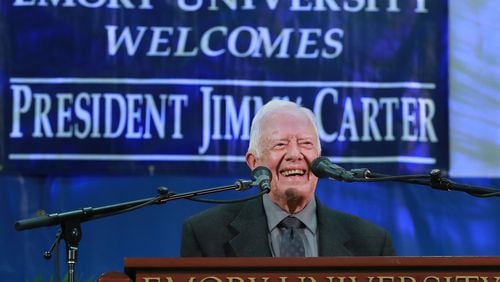Jimmy Carter has taught at Emory University in Atlanta for 37 years, but for all those years, he was not a tenured faculty member, a position the former U.S. president has joked he couldn’t achieve.
That changed Monday. Carter, Emory’s University Distinguished Professor, has been granted tenure.
His tenured faculty appointment is in four schools: Emory College of Arts and Sciences, Oxford College, Candler School of Theology and Rollins School of Public Health. The university said in a news release his appointment in those four schools “reflects the breadth of the president’s work and his impact on numerous fields.”
“Across nearly four decades, he has given Emory the full measure of what it means to be a public intellectual and an engaged faculty member,” the university’s president, Claire Sterk, said of Carter in a statement. “He has viewed teaching as a revered calling — the same humble approach he has brought to every undertaking, large and small, across a lifetime.”
> RELATED: Quotes and highlights from Jimmy Carter's 2018 town hall lecture at Emory
Tenure is a set of academic and legal rights that allows a faculty member to teach and conduct research without fear of losing his or her job. Many faculty members never receive tenure. It’s unlikely Emory would consider dismissing Carter, but the university thought it was important to extend him tenure.
In April 1982, Carter accepted a professorship at the university, which has campuses in DeKalb County and Oxford. Discussions in Carter’s early lectures ranged from explaining his decisions in the Iranian hostage crisis to peanut warehousing.
Carter typically lectures once a month in various classes, such as religion, public health and law. He frequently meets with students after class to offer advice about their projects. Lecturing also allowed Carter to discuss policy and politics.
“Emory has provided me with an unrestricted forum,” he said of the teaching experience in a 1984 Atlanta Constitution interview.
READ MORE
About the Author







